英语比较级
英语单词比较级
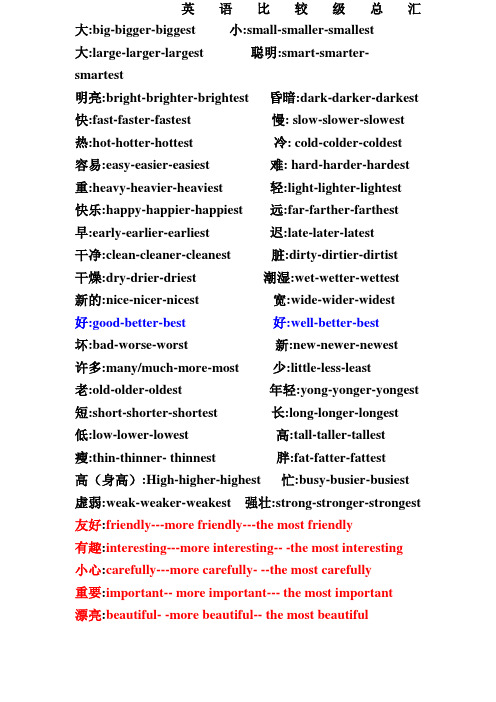
英语比较级总汇大:big-bigger-biggest 小:small-smaller-smallest大:large-larger-largest 聪明:smart-smarter- smartest明亮:bright-brighter-brightest 昏暗:dark-darker-darkest 快:fast-faster-fastest 慢: slow-slower-slowest 热:hot-hotter-hottest 冷: cold-colder-coldest容易:easy-easier-easiest 难: hard-harder-hardest 重:heavy-heavier-heaviest 轻:light-lighter-lightest快乐:happy-happier-happiest 远:far-farther-farthest 早:early-earlier-earliest 迟:late-later-latest干净:clean-cleaner-cleanest 脏:dirty-dirtier-dirtist干燥:dry-drier-driest 潮湿:wet-wetter-wettest新的:nice-nicer-nicest 宽:wide-wider-widest 好:good-better-best 好:well-better-best坏:bad-worse-worst 新:new-newer-newest许多:many/much-more-most 少:little-less-least老:old-older-oldest 年轻:yong-yonger-yongest 短:short-shorter-shortest 长:long-longer-longest 低:low-lower-lowest 高:tall-taller-tallest瘦:thin-thinner- thinnest 胖:fat-fatter-fattest高(身高):High-higher-highest 忙:busy-busier-busiest 虚弱:weak-weaker-weakest 强壮:strong-stronger-strongest 友好:friendly---more friendly---the most friendly有趣:interesting---more interesting-- -the most interesting小心:carefully---more carefully- --the most carefully重要:important-- more important--- the most important漂亮:beautiful- -more beautiful-- the most beautiful。
小学英语比较级、级大全

★这篇《⼩学英语⽐较级、级⼤全》,是⽆忧考特地为⼤家整理的,希望对⼤家有所帮助!1.在形容词词尾加上 “er” “est” 构成⽐较级、级:bright(明亮的)—brighter—brightest broad(⼴阔的)—broader—broadestcheap(便宜的)—cheaper—cheapest clean(⼲净的)—cleaner—cleanestclever(聪明的)—cleverer—cleverest cold(寒冷的)—colder—coldestcool(凉的)—cooler—coolest dark(⿊暗的)—darker—darkestdear(贵的)—dearer—dearest deep(深的)—deeper—deepestfast(迅速的)—faster—fastest few(少的)—fewer—fewestgreat(伟⼤的)—greater—greatest hard(困难的,硬的)—harder—hardesthigh(⾼的)—higher—highest kind(善良的)—kinder—kindestlight(轻的)—lighter—lightest long(长的)—longer—longestloud(响亮的)—louder—loudest low(低的)—lower—lowestnear(近的)—nearer—nearest new(新的)—newer—newestpoor(穷的)—poorer—poorest quick(快的)—quicker—quickestquiet(安静的)—quieter—quietest rich(富裕的)—richer—richestshort(短的)—shorter—shortest slow(慢的)—slower—slowestsmall(⼩的)—smaller—smallest smart(聪明的)—smarter—smartestsoft(柔软的)—softer—softest strong(强壮的)—stronger—strongestsweet(甜的)—sweeter—sweetest tall(⾼的)-taller-tallestthick(厚的)—thicker—thickest warm(温暖的)—warmer—warmestweak(弱的)—weaker—weakest young(年轻的)—younger—youngest2.双写最后⼀个字母,再加上 “er” “est” 构成⽐较级、级:big(⼤的)—bigger—biggest fat(胖的)—fatter—fattesthot(热的)—hotter—hottest red(红的)—redder—reddestsad(伤⼼的)—sadder—saddest thin(瘦的)—thinner—thinnestwet(湿的)—wetter—wettest mad(疯的)—madder—maddest3.以不发⾳的字母e结尾的形容词,加上 “r” “st” 构成⽐较级、级:able(能⼲的)—abler—ablest brave(勇敢的)—braver—bravestclose(接近的)—closer—closest fine(好的,完美的)—finer—finestlarge(巨⼤的)—larger—largest late(迟的)—later—latestnice(好的)—nicer—nicest ripe(成熟的)—riper—ripestrude(粗鲁的)—ruder—rudest safe(安全的)—safer—safeststrange(奇怪的)—stranger—strangest wide(宽⼴的)—wider—widestwise(睿智的,聪明的)—wiser—wisest white(⽩的)—whiter—whitest4.以字母y结尾的形容词,把y改为i,再加上 “er” “est” 构成⽐较级、级:busy(忙碌的)—busier—busiest dirty(脏的)—dirtier—dirtiestdry(⼲燥的)—drier—driest early(早的)—earlier—earliesteasy(容易的)—easier—easiest friendly(友好的)—friendlier—friendliestfunny(好玩的)—funnier—funniest happy(开⼼的)—happier—happiesthealthy(健康的)—healthier—healthiest heavy(重的)—heavier—heaviesthungry(饿的)—hungrier—hungriest lazy(懒惰的)—lazier—laziestlucky(幸运的)—luckier—luckiest naughty(调⽪的)—naughtier—naughtiestnoisy(嘈杂的)—noisier—noisiest pretty(美丽的)—prettier—prettiestsilly(傻的)—sillier—silliest spicy(辣的)—spicier—spiciestthirsty(渴的)—thirstier—thirstiest ugly(丑的)—uglier—ugliest5.双⾳节、多⾳节形容词,在单词前⾯加上 “more” “most” 构成⽐较级、级:afraid(害怕的)—more afraid—most afraidbeautiful(美丽的)—more beautiful—most beautifulcareful(仔细的)—more careful—most carefulcheerful(开⼼的)—more cheerful—most cheerfulcrowded(拥挤的)—more crowded—most crowdeddangerous(危险的)—more dangerous—most dangerousdelicious(美味的)—more delicious—most deliciousdifficult(困难的)—more difficult—most difficultexciting(令⼈兴奋的)—more exciting—most excitingexpensive(昂贵的)—more expensive—most expensivefamous(的)—more famous—most famousfrightened(受惊的)—more frightened—most frightenedfrightening(令⼈害怕的)—more frightening—most frighteninghard-working(勤奋的)—more hard-working—most hard-workinghelpful(有帮助的)—more helpful—most helpfulhonest(诚实的)—more honest—most honestimportant(重要的)—more important—most importantinteresting(有趣的)—more interesting—most interestingpolite(有礼貌的)—more polite—most politeterrible(可怕的)—more terrible—most terribletired(累的)—more tired—most tired6.不规则变化的形容词:bad(坏的)—worse—worst far(远的)—farther—farthest (far—further—furthest)good(好的)—better—best ill(病的)—worse—worstlittle(少的)—less—least many(多的)—more—most much(多的)—more—mostold(年⽼的)—older—oldest ( old—elder—eldest) well(好的,⾝体好的)—better—best。
英语比较级 最高级
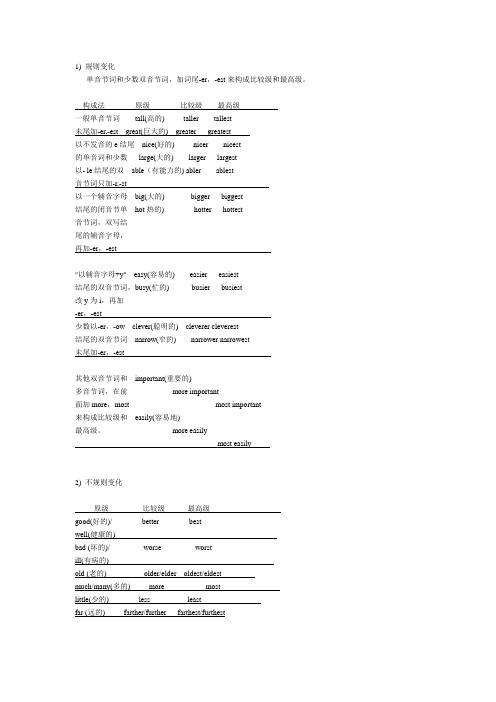
1) 规则变化单音节词和少数双音节词,加词尾-er,-est来构成比较级和最高级。
构成法原级比较级最高级一般单音节词tall(高的)taller tallest未尾加-er,-est great(巨大的)greater greatest以不发音的e结尾nice(好的)nicer nicest的单音词和少数large(大的)larger largest以- le结尾的双able(有能力的) abler ablest音节词只加-r,-st以一个辅音字母big(大的)bigger biggest结尾的闭音节单hot热的)hotter hottest音节词,双写结尾的辅音字母,再加-er,-est"以辅音字母+y"easy(容易的)easier easiest结尾的双音节词,busy(忙的)busier busiest改y为i,再加-er,-est少数以-er,-ow clever(聪明的)cleverer cleverest结尾的双音节词narrow(窄的)narrower narrowest未尾加-er,-est其他双音节词和important(重要的)多音节词,在前more important面加more,most most important来构成比较级和easily(容易地)最高级。
more easilymost easily2) 不规则变化原级比较级最高级good(好的)/better bestwell(健康的)bad (坏的)/worse worstill(有病的)old (老的)older/elder oldest/eldestmuch/many(多的)more mostlittle(少的)less leastfar (远的)farther/further farthest/furthest1)在否定句或疑问句中可用so…as。
He cannot run so/as fast as you.2)当as…as 中间有名词时采用以下格式。
英语中的比较级和最高级

英语中的比较级和最高级比较级和最高级是英语中用来对比两个或多个事物在特定品质或性质上的程度的语法结构。
在英语中,比较级和最高级分别用于形容词和副词的比较。
形容词的比较级和最高级比较级形容词的比较级用于比较两个事物在某种特定品质上的程度。
比较级的形式通常在形容词词尾加上 -er,或在前面加上 more。
例如:- old(年长的)→ older(更年长的)- beautiful(美丽的)→ more beautiful(更美丽的)最高级形容词的最高级用于比较三个或更多事物在某种特定品质上的程度,表示最高程度。
最高级的形式通常在形容词词尾加上 -est,或在前面加上 most。
例如:- old(年长的)→ oldest(最年长的)- beautiful(美丽的)→ most beautiful(最美丽的)副词的比较级和最高级比较级副词的比较级用于比较两个动作或状态在某种特定品质上的程度。
比较级的形式通常在副词词尾加上 -er,或在前面加上 more。
例如:- quickly(迅速地)→ more quickly(更迅速地)- slowly(慢慢地)→ slower(更慢慢地)最高级副词的最高级用于比较三个或更多动作或状态在某种特定品质上的程度,表示最高程度。
最高级的形式通常在副词词尾加上-est,或在前面加上 most。
例如:- quickly(迅速地)→ most quickly(最迅速地)- slowly(慢慢地)→ slowest(最慢慢地)以比较级和最高级来表达程度的变化在英语中非常常见,它们可以帮助我们更准确地描述事物之间的差异和特点。
在使用比较级和最高级时,需要注意形容词和副词的不规则变化形式,并且要根据上下文来判断使用哪种形式。
以上是关于英语中比较级和最高级的简要介绍。
比较级英语表达方式
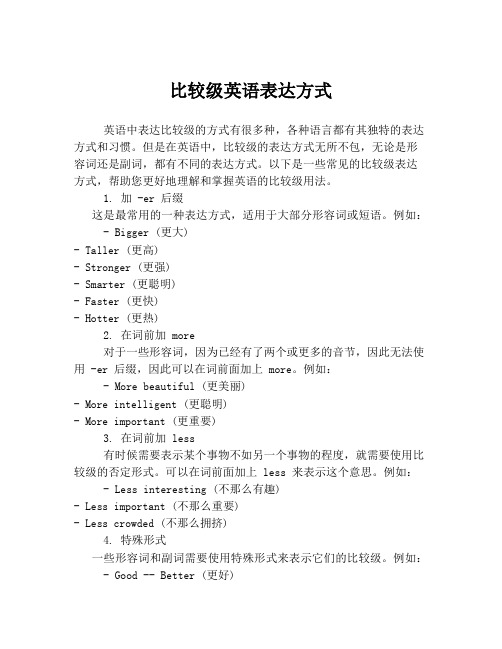
比较级英语表达方式英语中表达比较级的方式有很多种,各种语言都有其独特的表达方式和习惯。
但是在英语中,比较级的表达方式无所不包,无论是形容词还是副词,都有不同的表达方式。
以下是一些常见的比较级表达方式,帮助您更好地理解和掌握英语的比较级用法。
1. 加 -er 后缀这是最常用的一种表达方式,适用于大部分形容词或短语。
例如:- Bigger (更大)- Taller (更高)- Stronger (更强)- Smarter (更聪明)- Faster (更快)- Hotter (更热)2. 在词前加 more对于一些形容词,因为已经有了两个或更多的音节,因此无法使用 -er 后缀,因此可以在词前面加上 more。
例如:- More beautiful (更美丽)- More intelligent (更聪明)- More important (更重要)3. 在词前加 less有时候需要表示某个事物不如另一个事物的程度,就需要使用比较级的否定形式。
可以在词前面加上 less 来表示这个意思。
例如:- Less interesting (不那么有趣)- Less important (不那么重要)- Less crowded (不那么拥挤)4. 特殊形式一些形容词和副词需要使用特殊形式来表示它们的比较级。
例如:- Good -- Better (更好)- Bad -- Worse (更糟)- Many/Much -- More (更多)- Little -- Less (更少)- Far -- Further (更远)5. 不规则形式某些形容词和副词在表达比较级时不遵循规则,需要特别注意。
例如:- Good -- Better (更好)- Bad -- Worse (更糟)- Little -- Less (更少)- Far -- Further (更远)6. 更多的表达方式在英语中还有其他一些表达比较级的方式,例如:- The (most/least) + 形容词/副词这种表达方式常常用于比较多个事物之间的差异。
英语比较级(comparativedegree)

比较级(comparative degree)在比较级中,有超越、相等、差逊三个级别。
1. 超越(superiority)(1)better than: 胜过,优于Doing is better than saying.(百说不如一做。
)(2)more than + 从句。
多余,超过She has talked more than what is necessary.(她说了一些多余的话)(3)“than +关系代词”的从句。
再…… 不过。
He is a scholar than whom no man ever will be more honest.(他是个再诚实不过的学者了。
)(4)superior to :占优势,比……胜一筹。
He is superior to his elder brother.(他比他哥哥强)2. 相等(equality)(1) as …as. 如……一样。
As busy as a bee. ( 忙得不可开交)(2) as well as 。
既…… 又,和……一样。
Pompey, as well as Caesar, was a g reat man.(像恺撒一样,庞培也是一位伟人。
)(3) the same as…. 像……一样。
The same as the past. (一如从前。
)像……一样。
(4) such/ so…as.Such a great poet as Homer was proficient not just in literature but also in history .(像荷马那样的诗人,不仅要精通文学,还要精通历史。
)(5) no sooner than.. 一……就(几乎同时,夸张用法)。
No sooner said than done.(说到做到。
)(6) No more than. 就像,不优于。
You’re no more capable of speaking French than I am.(你我都不会说日语。
英语比较级的用法总结
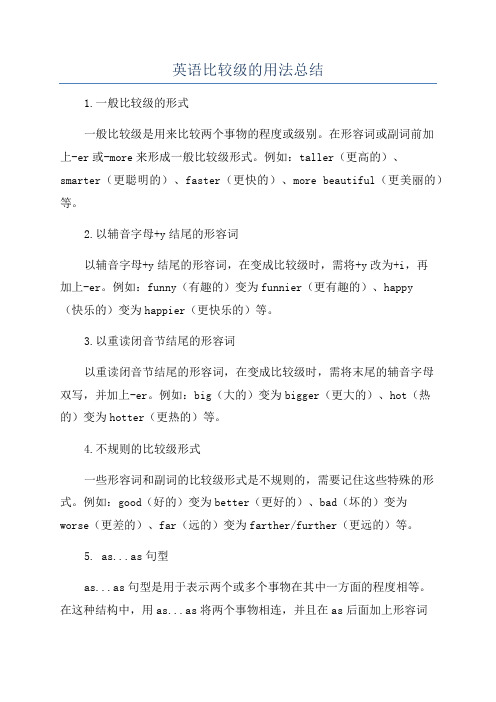
英语比较级的用法总结1.一般比较级的形式一般比较级是用来比较两个事物的程度或级别。
在形容词或副词前加上-er或-more来形成一般比较级形式。
例如:taller(更高的)、smarter(更聪明的)、faster(更快的)、more beautiful(更美丽的)等。
2.以辅音字母+y结尾的形容词以辅音字母+y结尾的形容词,在变成比较级时,需将+y改为+i,再加上-er。
例如:funny(有趣的)变为funnier(更有趣的)、happy(快乐的)变为happier(更快乐的)等。
3.以重读闭音节结尾的形容词以重读闭音节结尾的形容词,在变成比较级时,需将末尾的辅音字母双写,并加上-er。
例如:big(大的)变为bigger(更大的)、hot(热的)变为hotter(更热的)等。
4.不规则的比较级形式一些形容词和副词的比较级形式是不规则的,需要记住这些特殊的形式。
例如:good(好的)变为better(更好的)、bad(坏的)变为worse(更差的)、far(远的)变为farther/further(更远的)等。
5. as...as句型as...as句型是用于表示两个或多个事物在其中一方面的程度相等。
在这种结构中,用as...as将两个事物相连,并且在as后面加上形容词或副词的原级形式。
例如:She is as tall as her sister.(她和她妹妹一样高)6.比较级的用法比较级可以用来表达两个人或事物之间的差异或相似之处。
在句子中,比较级常常与than连用,表达一个事物在其中一方面比另一个事物更好或更差。
例如:He is taller than his brother.(他比他的兄弟更高)7.比较级的表示方法除了使用形容词或副词的比较级形式之外,还可以使用more或less加上形容词或副词的原级形式来表示比较级。
例如:He is more intelligent than his classmates.(他比他的同学更聪明)8.最高级的形式最高级是用来比较三个或三个以上人或物之间的级别或程度的形式。
英语单词中的比较级

没有比较级、最高级的形容词和副词英语中,有些形容词和副词没有比较等级,这主要是由于本身词义的缘故,在语义上不存在差别,这类词可称为不可分级形容词或副词。
主要有下列几类:1、本身就有比较级含义的词:senior年长的、较高的,junior年少的、较低的,prior在先的,anterior前面的,inferior次于、下等的,superior优于、上等的,posterior以后的,major主要的,minor次要的、较小的。
在使用这些词时无须加more,也不能和than连用,而要用介词to引出比较对象(这种表示法也称为拉丁比较级)。
例如:Thissocial system is super or than that system. 这种社会制度比那种优越。
He issenior to me by several years . 他比我大几岁。
Hismethod of doing reserach work is hardly appreciated ;he feels inferior toothers. 他做研究的方法没人欣赏;他感到比别人矮了一截。
2、表示状态或情况的词:afriad害怕的,asleep睡着的,alive活着的,alike相象的,awake醒着的,alone单独的,aware意识到的,ablaze着火的,adrift漂流的,afire燃烧着的,astray迷途,aghast惊呆的,ashamed羞耻的,alight照亮,astire 引动起来,afoot活动着的,ashore在岸上的,agape目瞪口呆,awerse不乐意的,afloat浮着。
3、表示形状的词;round圆形的,circular圆形的,oval椭圆形的,square方形的,oblong长方形的,angular角形的,level水平的,horizontal水平的。
4、表示物质特征的词;atomic原子的,solar太阳的,physical物理的,organic有机的,economic 经济的,sonic声音的,scientific科学的,wooden木制的,earthen泥土的,golden黄金般的,woolen羊毛的,bronze青铜的,silver银制的。
英语比较级和最高级的基本知识

英语比较级和最高级的基本知识比较级和最高级是英语中用于比较事物的形容词和副词的两个形式。
比较级用于将两个事物进行比较,而最高级用于将三个或更多事物进行比较。
掌握这些基本知识对于正确使用和理解英语的比较概念至关重要。
一、比较级1. 形容词和副词的构成:- 单音节和部分双音节词在词尾加上 "-er" 来构成比较级,同时需要在词前加上 "more" 作为限定,如 "taller"、"more beautiful"。
- 多音节词和部分双音节词在词前加上 "more" 来构成比较级,如 "more interesting"、"more intelligent"。
2. 比较级的用法:- 比较级用于两者之间进行比较,如 "This book is more interesting than that book."- 比较级通常在句子中放在比较的两个事物之间,用 "than" 连接,如 "She is taller than her brother."- 当比较的事物是同类事物时,比较级常用来表达更高的程度,如 "I am feeling better today."3. 特殊形式的比较级:- 对于部分词尾以 "e" 结尾的词,在词尾加上 "-r",如 "nicer"。
- 部分以 "y" 或 "er" 结尾的双音节词,在词尾加上 "-er",如"happier"。
- 部分单音节词以辅音字母结尾,要先双写该辅音字母再加上"-er",如 "bigger"。
英语比较级
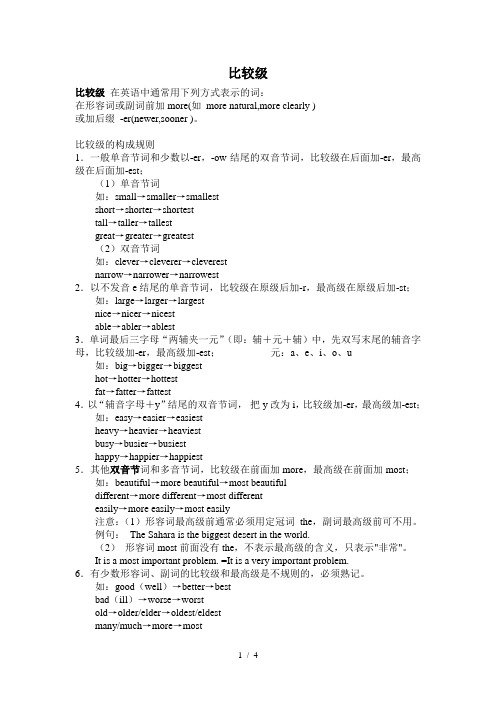
比较级比较级在英语中通常用下列方式表示的词:在形容词或副词前加more(如more natural,more clearly )或加后缀-er(newer,sooner )。
比较级的构成规则1.一般单音节词和少数以-er,-ow结尾的双音节词,比较级在后面加-er,最高级在后面加-est;(1)单音节词如:small→smaller→smallestshort→shorter→shortesttall→taller→tallestgreat→greater→greatest(2)双音节词如:clever→cleverer→cleverestnarrow→narrower→narrowest2.以不发音e结尾的单音节词,比较级在原级后加-r,最高级在原级后加-st;如:large→larger→largestnice→nicer→nicestable→abler→ablest3.单词最后三字母“两辅夹一元”(即:辅+元+辅)中,先双写末尾的辅音字母,比较级加-er,最高级加-est;元:a、e、i、o、u如:big→bigger→biggesthot→hotter→hottestfat→fatter→fattest4.以“辅音字母+y”结尾的双音节词,把y改为i,比较级加-er,最高级加-est;如:easy→easier→easiestheavy→heavier→heaviestbusy→busier→busiesthappy→happier→happiest5.其他双音节词和多音节词,比较级在前面加more,最高级在前面加most;如:beautiful→more beautiful→most beautifuldifferent→more different→most differenteasily→more easily→most easily注意:(1)形容词最高级前通常必须用定冠词the,副词最高级前可不用。
英语比较级

形容词的比较级和最高级。
(1)单音节词加词尾-er,-est来构成比较级和最高级。
tall(高的)taller tallest
(2)以不发音的e结尾去e 加-er,-est:
nice(好的);large(大的)
(3)以一个辅音字母结尾的闭音节单音节词,双写结尾的辅音字母:big;hot;red;thin;fat。
(4)以辅音字母+y"结尾的双音节词,改y为i,再加-er,-est:
easy(容易的)busy;happy;heavy;lazy;lucky;early;angry. (5)以ly结尾的副词,除-earlier-earliest,其他都是加more most. Slowly-more slowly-most slowly
(6)少数以-er,-ow结尾的双音节词未尾加-er,-est
clever(聪明的)narrow(窄的)
(7)其他双音节词和多音节词在前面加more,most。
如:important(重要的) more important most important
easily(容易地) more easily most easily
(8) 不规则变化
有一些词的比较级、最高级变化是不规则的,需要特殊记忆。
good / well→better→best bad / ill/badly→worse→worst
many / much→more→most little→less→least
far→farther→farthest(距离) / far→further→furthest (程度)
old→older / elder→oldest (新旧或年龄) / eldest (长幼关系)。
英语比较级语法

比较级:就是将二者进行比较产生的词形,是由形容词原级转化而来的。
一般是在原级后面加er,也有一些不规则的转化,比如good—better,bad—worse,有很多。
相对二者的比较,还有三者及以上的比较,这时就产生了最高级。
当我们需要对事物作出比较时,需要用到比较级,比如:He is younger than me.他比我年轻。
Pay Attention:比较的两者应该是互相对应的可比较的东西。
典型错误:My hair is longer than you.(我的头发比你更长。
)比较的两者是我的头发、你(整个人),那么比较的对象就没有可比性。
应该改为:My hair is longer than yours. 或My hair is longer than your hair.形容词的比较级是在形容词的基础上变化而来的,它的变化规则是:1. 一般的直接在词尾加er ,如 tall - taller , strong - stronger2. 以e结尾的,直接加r ,如 fine – finer3. 以辅音字母加y结尾的,先改y为i再加er,如funny - funnier4. 重读闭音节词词尾只有一个辅音字母,元音发短音时,双写最后的字母再加er,如big –bigger, thin–thinner, hot–hotter5. 多音节词和部分双音节词,在词前加“more”。
6. 由“动词+后缀-ing/-ed”构成的形容词,在词前加more构成比较级。
如:interesting-more interesting,bored-more bored。
7. 由“形容词+后缀-ly”构成的副词,在该副词前加more构成比较级。
如:slowly-more slowly,happily- more happily。
除此之外,还有几个特殊的单词,它的比较级是不规则的,如:many / much(原形)– more(比较级)little / few(原形)– less (比较级)good(原形)– better(比较级)bad (原形)– worse(比较级)far (原形)– further(比较级)比较级的句子结构通常是:什么 + 动词be (am , is , are ) + 形容词比较级 + than(比)+ 什么。
英语比较级和最高级
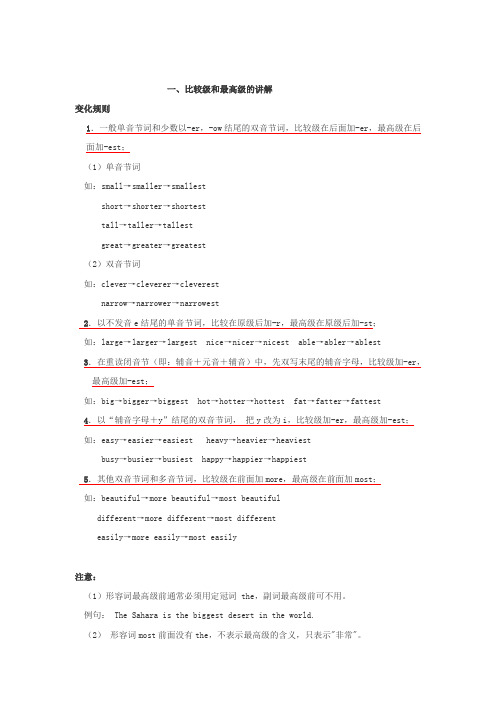
一、比较级和最高级的讲解变化规则1.一般单音节词和少数以-er,-ow结尾的双音节词,比较级在后面加-er,最高级在后面加-est;(1)单音节词如:small→smaller→smallestshort→shorter→shortesttall→taller→tallestgreat→greater→greatest(2)双音节词如:clever→cleverer→cleverestnarrow→narrower→narrowest2.以不发音e结尾的单音节词,比较在原级后加-r,最高级在原级后加-st;如:large→larger→largest nice→nicer→nicest able→abler→ablest3.在重读闭音节(即:辅音+元音+辅音)中,先双写末尾的辅音字母,比较级加-er,最高级加-est;如:big→bigger→biggest hot→hotter→hottest fat→fatter→fattest4.以“辅音字母+y”结尾的双音节词,把y改为i,比较级加-er,最高级加-est;如:easy→easier→easiest heavy→heavier→heaviestbusy→busier→busiest happy→happier→happiest5.其他双音节词和多音节词,比较级在前面加more,最高级在前面加most;如:beautiful→more beautiful→most beautifuldifferent→more different→most differenteasily→more easily→most easily注意:(1)形容词最高级前通常必须用定冠词 the,副词最高级前可不用。
例句: The Sahara is the biggest desert in the world.(2)形容词most前面没有the,不表示最高级的含义,只表示"非常"。
英语比较级变化规则
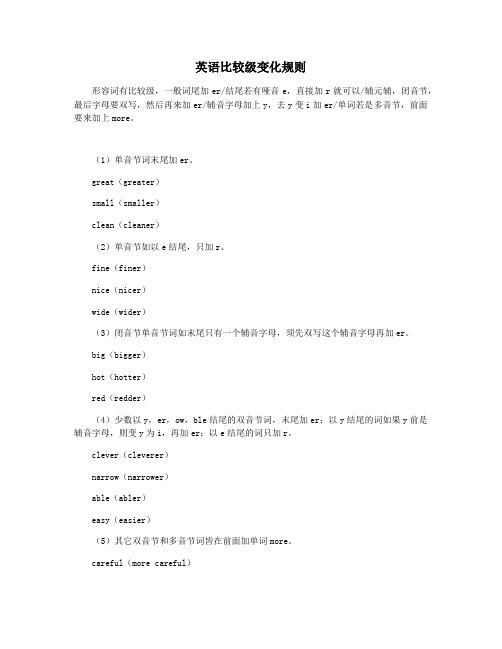
英语比较级变化规则
形容词有比较级,一般词尾加er/结尾若有哑音e,直接加r就可以/辅元辅,闭音节,最后字母要双写,然后再来加er/辅音字母加上y,去y变i加er/单词若是多音节,前面要来加上more。
(1)单音节词末尾加er。
great(greater)
small(smaller)
clean(cleaner)
(2)单音节如以e结尾,只加r。
fine(finer)
nice(nicer)
wide(wider)
(3)闭音节单音节词如末尾只有一个辅音字母,须先双写这个辅音字母再加er。
big(bigger)
hot(hotter)
red(redder)
(4)少数以y,er,ow,ble结尾的双音节词,末尾加er;以y结尾的词如果y前是辅音字母,则变y为i,再加er;以e结尾的词只加r。
clever(cleverer)
narrow(narrower)
able(abler)
easy(easier)
(5)其它双音节和多音节词皆在前面加单词more。
careful(more careful)
difficult(more difficult)
delicious(more delicious)
有些词的比较级变化不规则,则需要特殊记忆。
good/well(better)
bad(worse)
many/much(more)
little(less)
far(farther)
感谢您的阅读,祝您生活愉快。
(完整版)英语单词比较级
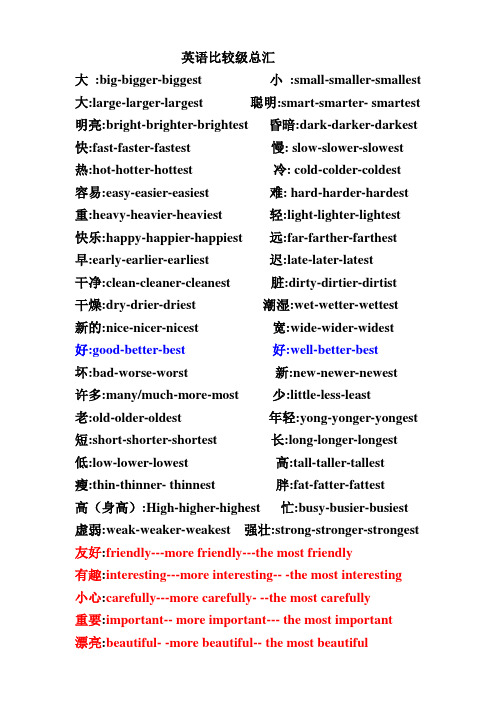
英语比较级总汇大:big-bigger-biggest 小:small-smaller-smallest 大:large-larger-largest 聪明:smart-smarter- smartest 明亮:bright-brighter-brightest 昏暗:dark-darker-darkest 快:fast-faster-fastest 慢: slow-slower-slowest 热:hot-hotter-hottest 冷: cold-colder-coldest容易:easy-easier-easiest 难: hard-harder-hardest 重:heavy-heavier-heaviest 轻:light-lighter-lightest快乐:happy-happier-happiest 远:far-farther-farthest 早:early-earlier-earliest 迟:late-later-latest干净:clean-cleaner-cleanest 脏:dirty-dirtier-dirtist干燥:dry-drier-driest 潮湿:wet-wetter-wettest新的:nice-nicer-nicest 宽:wide-wider-widest 好:good-better-best 好:well-better-best坏:bad-worse-worst 新:new-newer-newest许多:many/much-more-most 少:little-less-least老:old-older-oldest 年轻:yong-yonger-yongest 短:short-shorter-shortest 长:long-longer-longest 低:low-lower-lowest 高:tall-taller-tallest瘦:thin-thinner- thinnest 胖:fat-fatter-fattest高(身高):High-higher-highest 忙:busy-busier-busiest 虚弱:weak-weaker-weakest 强壮:strong-stronger-strongest 友好:friendly---more friendly---the most friendly有趣:interesting---more interesting-- -the most interesting小心:carefully---more carefully- --the most carefully重要:important-- more important--- the most important漂亮:beautiful- -more beautiful-- the most beautiful。
英语单词比较级
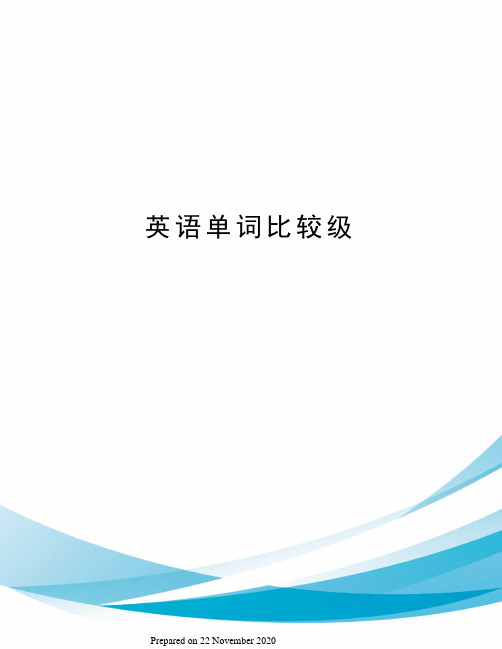
英语单词比较级英语比较级总汇大:big-bigger-biggest 小:small-smaller-smallest大:large-larger-largest 聪明:smart-smarter- smartest明亮:bright-brighter-brightest 昏暗:dark-darker-darkest 快:fast-faster-fastest 慢: slow-slower-slowest热:hot-hotter-hottest 冷: cold-colder-coldest容易:easy-easier-easiest 难: hard-harder-hardest重:heavy-heavier-heaviest 轻:light-lighter-lightest快乐:happy-happier-happiest 远:far-farther-farthest 早:early-earlier-earliest 迟:late-later-latest干净:clean-cleaner-cleanest 脏:dirty-dirtier-dirtist干燥:dry-drier-driest 潮湿:wet-wetter-wettest新的:nice-nicer-nicest 宽:wide-wider-widest 好:good-better-best 好:well-better-best坏:bad-worse-worst 新:new-newer-newest许多:many/much-more-most 少:little-less-least老:old-older-oldest 年轻:yong-yonger-yongest短:short-shorter-shortest 长:long-longer-longest低:low-lower-lowest 高:tall-taller-tallest瘦:thin-thinner- thinnest 胖:fat-fatter-fattest高(身高):High-higher-highest 忙:busy-busier-busiest虚弱:weak-weaker-weakest 强壮:strong-stronger-strongest 友好:friendly---more friendly---the most friendly有趣:interesting---more interesting-- -the most interesting 小心:carefully---more carefully- --the most carefully重要:important-- more important--- the most important漂亮:beautiful- -more beautiful-- the most beautiful。
英语单词的比较级和最高级
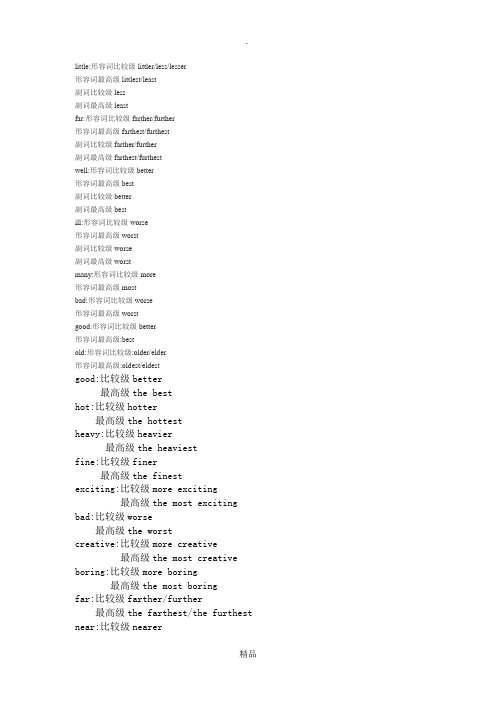
little:形容词比较级littler/less/lesser形容词最高级littlest/least副词比较级less副词最高级leastfar:形容词比较级farther/further形容词最高级farthest/furthest副词比较级farther/further副词最高级farthest/furthestwell:形容词比较级better形容词最高级best副词比较级better副词最高级bestill:形容词比较级worse形容词最高级worst副词比较级worse副词最高级worstmany:形容词比较级more形容词最高级mostbad:形容词比较级worse形容词最高级worstgood:形容词比较级better形容词最高级:bestold:形容词比较级:older/elder形容词最高级:oldest/eldestgood:比较级better最高级the besthot:比较级hotter最高级the hottestheavy:比较级heavier最高级the heaviestfine:比较级finer最高级the finestexciting:比较级more exciting最高级the most exciting bad:比较级worse最高级the worstcreative:比较级more creative最高级the most creative boring:比较级more boring最高级the most boringfar:比较级farther/further最高级the farthest/the furthest near:比较级nearer最高级the nearest如有侵权请联系告知删除,感谢你们的配合!。
- 1、下载文档前请自行甄别文档内容的完整性,平台不提供额外的编辑、内容补充、找答案等附加服务。
- 2、"仅部分预览"的文档,不可在线预览部分如存在完整性等问题,可反馈申请退款(可完整预览的文档不适用该条件!)。
- 3、如文档侵犯您的权益,请联系客服反馈,我们会尽快为您处理(人工客服工作时间:9:00-18:30)。
一般说来,英语中大多数形容词、副词的比较级形式都能表示比较的意义。
但是也有一些比较级形式并非表示比较,如:He is no more a good player than I am. (他和我一样都不是好球员。
)现就某些比较结构的特殊含义分述如下:一、表示程度。
1. more than 不止,不仅仅,非常,极其This more than satisfied me. 这使我十分满意。
2. more or less 差不多,几乎I've more or less finished reading the book. 我差不多已经把这本书看完了。
3. more than a little 非常If you tell your father what you've done, he'll be more than a little angry. 如果你把你做的事告诉你父亲,他会非常生气。
二、表示数量。
1. two/some/many/much/a few/ a little more … 再……,还……①Would you like some more coffee? 你要再来点咖啡吗?②We need a few more. 我们还需要一些。
2. no (not any) more than 不过,仅仅,只有There are no (not any) more than ten tickets left. 仅剩下十张票了。
3. not more than 不多于,不超过I read not more than twenty pages every day. 我每天最多读二十页书。
4. less than 少于It'll take less than five minutes to get there. 到那儿用不了五分钟。
5. no less than 有……之多We won no less than 500 dollars in a competition. 我们在一场比赛中赢了500 美元。
6. not less than 至少,不下于The number of the students is not less than 1,000. 学生数至少有1,000 。
7. more or less 大致,大约It took more or less a whole day to paint the ceiling. 粉刷天花板用了将近一整天的时间。
8. neither more nor less than 恰好,不多不少I have neither more nor less than 100 Yuan. 我恰好有100 元。
9. better than 多于,超过It is better than 20km to the station. 到车站的距离超过2 万米。
三、表示时间1. no sooner … than … 一……就……,刚……就……No sooner had he entered the office than the telephone rang. 他刚进办公室,电话铃就响了。
2. sooner or later 迟早Sooner or later his dream will come true. 他的梦想迟早会变成现实。
3. (in) less than no time 立即,很快,一会儿It took him less than no time to get ready. 他很快就准备好了。
四、表示语气1. It is better + (for sb.) + to do … / It is better that … 最好……,……较好It is better for you to go to bed early. / It is better that you (should) go to bed early. 你最好早点上床睡觉。
2. had better 最好;还是……好You'd better not say that. 你最好别说那样的话。
3. (be) little/no better than 实际上,简直就是He's no better than a beggar. 他简直就是乞丐。
4. neither more nor less than 科,和……完全一样。
He is neither more nor less than an idler. 他是个不折不扣的懒虫。
5. nothing less than 完全是,和……一模一样His negligence was nothing less than criminal. 他的粗心大意无异于犯罪。
五、表示递进。
1. much/still more ;更加still/much/even less 更不必说;何况I like English; much more maths. 我喜欢英语,更喜欢数学。
2. all the more 更加;越发I told him to stop shouting; but he only shouted all the more. 我叫他不要喊,但他反而喊得更厉害。
3. (and) what is more 而且;此外;更有甚者You've come late for school, and what's more, you've lost your books. 你上学迟到,还把书丢了。
4. more and more 愈……愈……As time went on, he found it more and more difficult to support his family. 时间一天天过去,他发现养家越来越不容易。
5. the more, the more/less 越……越/ 越不……The more haste, the less speed. 欲速则不达。
6. think better of sb. /sth. 更高地评价……If you acknowledge your faults, they will think better of you. 如果你承认自己的过失,他们对你的看法会更好。
7. any (the) less 较少/ 更小一些She wasn't any the less happy for being on her own. 她并不因独自一人而稍有不悦。
8. all the better 更好、更加If he can come earlier, all the better. 他要是能早来一点儿,那就更好了。
9. so much the better/ worse (for sb. /sth.) 甚至更好/ 更坏The result is not very important to us, but if we do win, (then) so much the better. 输赢对我们并不十分重要,但假如我们赢了,那就更好了。
六、表示选择。
1. more … than … 与其说……倒不如说……;不是……而是……He was more surprised than angry. 他并非生气,而是大吃一惊。
2. would sooner / rather … than … 与其……(宁愿)……I'd sooner/rather play football than go swimming. 我倒想踢足球,不想游泳。
3. (be) more like … than … 不像……倒像……It is more like a lion than a dog. 它不像一条狗,倒像一头狮子。
4. rather … than … /rather than 宁可,而不I am rather bored than tired. 我与其说是疲惫,不如说是厌倦。
5. other than 除了……,除……之外I can't do other than obey. 除了服从,我别无他法。
6. rather … than otherwise 不是别的而是……It is rather cold than otherwise. 天还是挺冷的。
7. no/none other than 正是,除……之外无其他That man was no/none other than my husband. 那个人(不是别人)正是我丈夫。
七、表示否定。
1. no longer /not … any longer; no more/not … any more 不再The old man stays in his village now; he doesn't travel any more/any longer. 这老人现在住在村子里,他不再旅游了。
2. no more 不再;不复存在(死了);也不;也没有Time lost will return no more. 失去的时间不会再来。
3. less than 不……His long speech left me less than satisfactory. 我对他的长篇演讲很不满意。
八、表示频度。
1. more often than not 经常;多半Nancy comes to work early more often than not. 南希经常上班很早。
2. see more/less of someone 更常/ 少见;再/ 少见到I hope we'll see more of you. 我希望我们能够和你再见面。
九、表示持续。
1. once more 再;又The teacher said he'd repeat the question once more. 老师说他会把问题再说一遍。
2. none + the + 比较极:毫不;毫无After hearing her talk on computers I'm afraid I'm none the wiser. 听了他的有关电脑的报告后,我似乎毫无收获。
